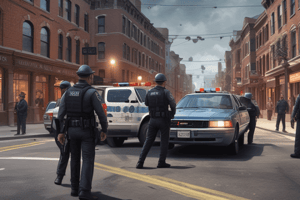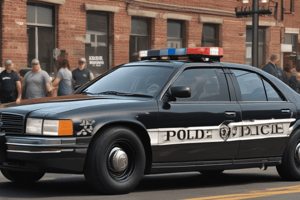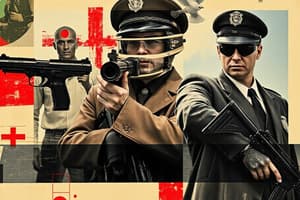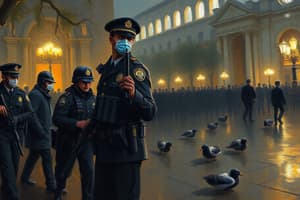Podcast
Questions and Answers
What is the primary role of a Royal Police Force constable?
What is the primary role of a Royal Police Force constable?
- To maintain law and order, prevent crime, and respond to emergencies. (correct)
- To conduct investigations for major crimes only.
- To serve as a judge in criminal cases.
- To train new recruits in military tactics.
Which of the following is not a key responsibility of a constable?
Which of the following is not a key responsibility of a constable?
- Investigating crimes.
- Carrying out patrols.
- Providing legal advice to citizens. (correct)
- Enforcing traffic regulations.
What type of training do RPF constables typically undergo?
What type of training do RPF constables typically undergo?
- Political science and public speaking.
- Law enforcement procedures and community relations. (correct)
- Advanced surgical techniques.
- Information technology and computer science.
What authority do constables generally have?
What authority do constables generally have?
Which of the following best describes the ethical conduct expected from RPF constables?
Which of the following best describes the ethical conduct expected from RPF constables?
What is a typical requirement for constables regarding their uniform?
What is a typical requirement for constables regarding their uniform?
What type of environment do RPF constables often work in?
What type of environment do RPF constables often work in?
Which of the following is not part of the equipment typically used by constables?
Which of the following is not part of the equipment typically used by constables?
Flashcards
RPF Constable Role
RPF Constable Role
A uniformed police officer who keeps order, prevents crime, and responds to emergencies.
RPF Constable Responsibilities
RPF Constable Responsibilities
Enforce laws, respond to calls, provide security/support, control traffic, help victims, investigate crime, maintain order, and patrol.
RPF Constable Qualifications
RPF Constable Qualifications
Vary by country; usually includes physical, psychological tests and police academy training in law, justice, first aid, tactics, firearms, and community relations.
RPF Constable Powers
RPF Constable Powers
Signup and view all the flashcards
RPF Constable Uniform
RPF Constable Uniform
Signup and view all the flashcards
Ethical Conduct in RPF
Ethical Conduct in RPF
Signup and view all the flashcards
RPF Constable Working Challenges
RPF Constable Working Challenges
Signup and view all the flashcards
RPF Training Scope
RPF Training Scope
Signup and view all the flashcards
Study Notes
Definition and Role
- A Royal Police Force (RPF) constable is a uniformed police officer in the Royal Police Force of a specific country (e.g., Rwanda).
- Their primary role is to maintain law and order, prevent crime, and respond to emergencies within their designated area.
Key Responsibilities
- Enforce laws by carrying out patrols, investigating crimes, and making arrests, where necessary.
- Respond to calls for service from the public, including emergencies and complaints.
- Provide security and support to public events and gatherings.
- Conduct traffic control and enforce traffic regulations.
- Provide assistance to victims of crime and investigate the circumstances surrounding the crime.
- Gather evidence, interview witnesses, and prepare reports.
- Maintain order in public places and resolve conflicts peacefully.
- Patrol their assigned areas, watching for suspicious activities and enforcing laws.
Qualifications and Training
- Specific qualifications and training requirements can vary based on the governing country and the RPF.
- Typically, candidates will undergo rigorous physical and psychological testing, along with specific police academy training.
- The training usually encompasses instruction on law enforcement procedures, criminal justice, first aid, defensive tactics, firearms handling, and community relations.
Powers and Authority
- Constables have the power to arrest individuals suspected of committing crimes, seize evidence, detain persons, and issue penalties for minor offenses, consistent with the legal framework of their designated jurisdiction.
- Powers and authorities are granted according to the law of the specific country.
Uniform and Equipment
- Constables are typically required to wear a designated uniform, which can include a specific type of clothing, accessories, and identification badges.
- Their equipment may include a radio or other communication devices, police-issued firearms (if applicable), and related law enforcement tools and weapons.
Ethical Conduct and Standards
- High standards of ethical conduct, such as integrity, fairness, and impartiality, are expected from all RPF constables.
- Stricter codes of conduct exist to uphold professional standards and ensure accountability related to specific instances.
Working Environment and Challenges
- Constables most frequently work in challenging environments due to high-crime areas, public hostility, or extreme conditions.
- Dealing with community relations challenges is part of the daily task.
- Constant exposure to potentially dangerous situations and potentially unpredictable public reactions is expected.
Community Relations
- Building and maintaining positive community relations are crucial in successful law enforcement.
- Regular community engagement and interaction will enhance trust and cooperation.
- Establishing trustworthy communication channels between the police and community members is equally important.
Studying That Suits You
Use AI to generate personalized quizzes and flashcards to suit your learning preferences.




